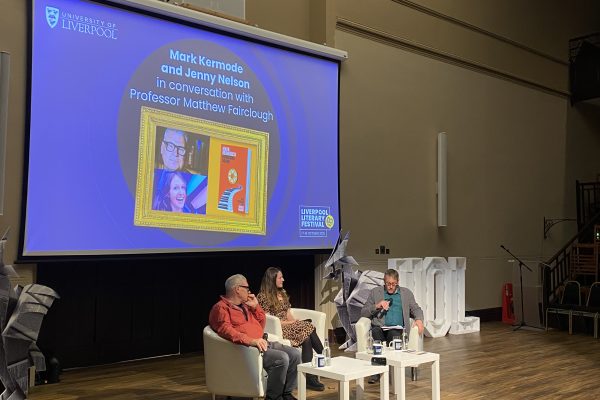6th November 2023
Listen
Listen

Last month the Liverpool Literary Festival welcomed renowned film critic Mark Kermode and radio producer Jenny Nelson to talk about their new book, ‘Surround Sound: The Stories of Movie Music’. As a joint honour’s student of both film and music, naturally I jumped at the chance to attend. Interviewed by Professor Matthew Fairclough, deputy of the music department here at the University of Liverpool, the talk made for a wonderful evening.
The evening began with a brief history of the book, Kermode revealing it was commissioned 11 years ago, but the critic struggled to write and left the project alone for 8 years.
Kermode and Nelson have worked together for several years now, co-hosting the weekly film scores show on Scala Radio. Once Nelson was on board, the project was revived, and the book was completed in under 2 years. The two discussed their aims for the book, wanting it to be accessible, not requiring background or specialist knowledge. Kermode noted that despite being in Skiffle band ‘The Dodge Brothers’, who performed in Birkenhead the night before, he cannot read sheet music. Nelson added that most of the people writing to their radio show simply spoke about how soundtracks made them feel, rather than the technicalities, and it is this love for film music that the two embody in their book.
A key point made by the two when discussing their intentions for the book was their desire to curate an alternative narrative of film music instead of retelling the same histories of the white, male, Oscar-winning composers that we know so well. Nelson offered an inspiring level of passion here, especially to a female music student like myself in the audience. Looking back on her work interviewing composers, she recalls the story of a female composer being told her music would never be masculine enough, which Kermode remarked was ‘insane’.
Interviewer Professor Matthew Fairclough is a composer himself, as well as director of Music Technology at the University. A classic, controversial conversation in film music, Fairclough asked if it is always good to have music in film, with Kermode pointing to films such as The Zone of Interest (2023) as examples of films where a lack of music really works.
This led to the discussion of less-traditional scores, along the lines of a soundscape rather than music. Fairclough smiled and nodded as he expressed his love for what Kermode said some people consider an ‘atonal squawkfest’. Forbidden Planet (1956), for example, was the first film to have an entirely electronic score, and notably wasn’t allowed to call the soundtrack music due to issues with the Musician’s Union. Instead, the soundtrack is credited as ‘electronic tonalities’, which reminded me of a first-year module I took on electronic and avant-garde music. Fairclough argued that electronic music has the benefit of doing things immediately, unlike notation, drawing attention to how Vangelis composed the music for Blade Runner (1982) live and intuitively whilst watching the film.
From this section of the talk alone I found that Kermode and Nelson had succeeded in their goal of offering an alternative narrative to the traditional history of ‘movie music’, sparking a discussion and drawing attention to the less conventional and less-known modes of composition and production. Kermode even guaranteed that if you pick up the book and look in the index, your favourite film will not be there, a humorously successful statement in promoting his work.
Overall the talk was exciting, inspiring, and ultimately a joy to attend – not just as a film and music student, but for anyone wanting to learn a bit more about movie music and the numerous stories and pathways involved.
To read the rest of our coverage of the Liverpool Literary Festival, please click here:
https://www.liverpoolguildstudentmedia.co.uk/category/on-campus